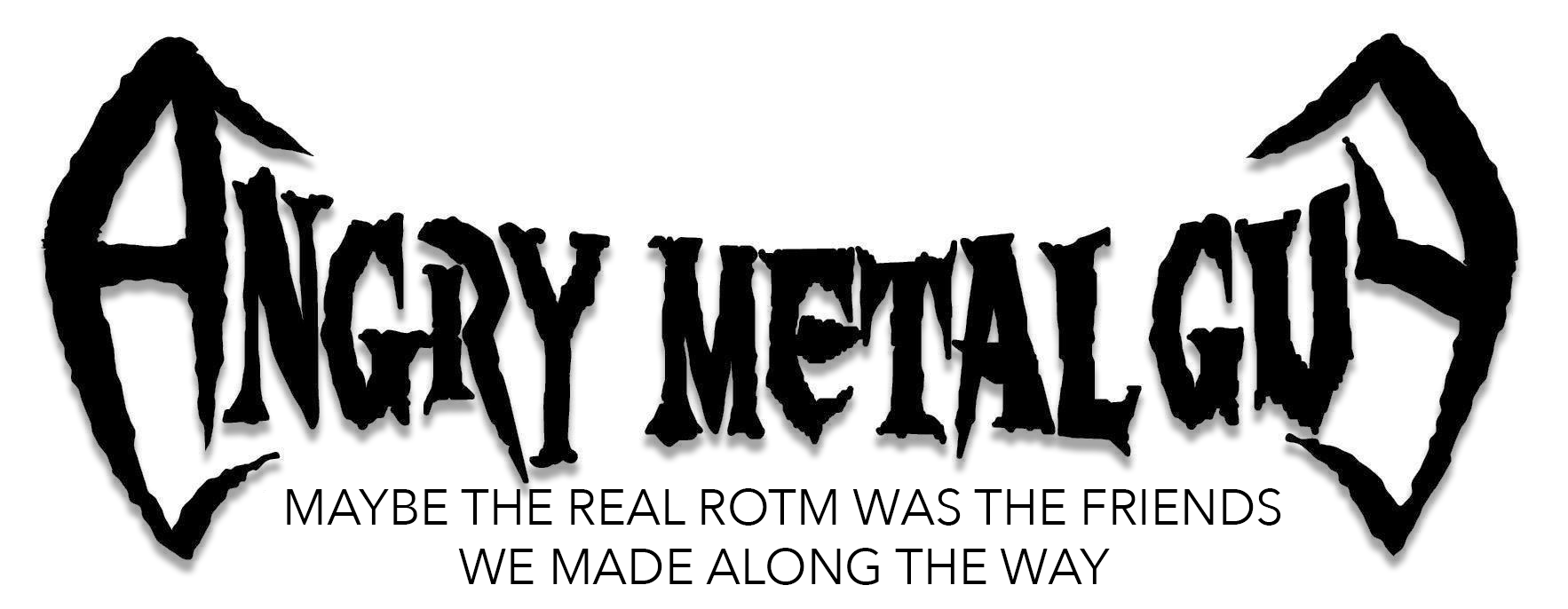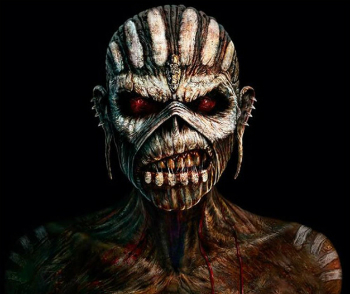 On the 4th of September Iron Maiden will release its 16th studio album. This new platter is slated to be a double-disc monstrosity by the name of The Book of Souls, and I’m currently listening to the promo and putting together an equally epic review of it. In honor of this, I’m going to take advantage of the moment to do something I’ve wanted to do for a very, very long time: a huge Iron Maiden retrospective, spanning the band’s entire studio discography.
On the 4th of September Iron Maiden will release its 16th studio album. This new platter is slated to be a double-disc monstrosity by the name of The Book of Souls, and I’m currently listening to the promo and putting together an equally epic review of it. In honor of this, I’m going to take advantage of the moment to do something I’ve wanted to do for a very, very long time: a huge Iron Maiden retrospective, spanning the band’s entire studio discography.
Iron Maiden is the iconic heavy metal band in my mind. While others are honored members of the heavy metal pantheon, it is my opinion that Maiden mastered heavy metal and presented it as it should be presented. Of course, things have progressed since they left their biggest mark on the scene, but at a time when the genre wasn’t nearly as sophisticated and broad as it is today, Iron Maiden was a unique beacon, driving for the horizon of what metal could be as an art form.
I spent most of my youth playing the band’s discography to death, and much of my late teens and 20s blowing my paychecks on Iron Maiden merch. I have been (but am not today) a card carrying member of the Iron Maiden fan club, and I can’t think of a band whose discography, minutiae, and history I know better. And that is why I am the perfect guy to write this thing.
A disclaimer: this may come off as pretty harsh at times, but know that this is all done with love and adoration. When one spends as much time as I have with a band, one begins to have a very honest relationship with what’s good or bad about that band. As this is a “Worst to Best” list, you shouldn’t expect this all to be a fawning celebration of every note the band has produced. But I can’t think of a band that has brought more value to my life than Maiden, and every one of these records has received hundreds of spins. So before you go getting your panties in a bunch, remember that the better you know someone, the more you see their flaws, and if I didn’t love this band as much as I do, I could never have written a 10k word retrospective of every single album.
Up the Irons!
#15: No Prayer for the Dying [1990]: When I asked what the worst Iron Maiden record ever was over at the AMG Facebook, I was rewarded with two responses: Virtual XI and No Prayer for the Dying. This wasn’t really a surprise to me as that’s essentially how I’ve traditionally felt about the matter, too. But the fact that No Prayer for the Dying is less popular is kind of an interesting tale. How did the follow-up to Iron Maiden’s massive success of Seventh Son of a Seventh Son end up with such a tremendous disappointment?
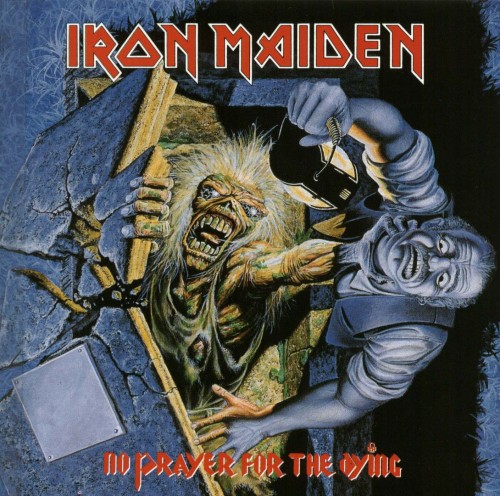
There are two major things that happened in Iron Maiden in the run up to No Prayer for the Dying that almost certainly doomed it to this position on the list of greatest albums. Remember, Seventh Son of a Seventh Son was the band’s (to date) largest commercial success in the United States and No Prayer for the Dying sold like hotcakes because of that success. But Adrian Smith left the band in a fight over the future direction of the sound. He wanted to do what would naturally be seen as the obvious direction for an Iron Maiden record after Seventh Son of a Seventh Son, similar in tenor and heavily produced with synth, epic writing and so on. He was overruled by a band that felt they’d lost that lovin’, er, old school feeling and wanted to put out a record that had more in common with Killers than Seventh Son. H probably said something cute and English like “Ah, this is bollocks!” or “Sod off!” and bailed to eat biscuits and smile politely while thinking nasty thoughts about the rest of the band. Enter Janick Gers who, while distracting live, is actually a really cool guitar player in a lot of ways. He doesn’t complement Murray like Smith did, as both Murray and he seem to be of the same school of blues-based, off-the-cuff soloing, but he’s not a bad player by any means.
The other major development was that Bruce Dickinson discovered that he had vocal chords in his scrotum. His vocals on this record are hard to swallow, and generally give the impression that he was lacking passion. I think the idea with Dickinson getting this old, horny blues rock vocalist thing on was part of this ‘return to their roots’ bit that Maiden was on with; y’know, intentional. But for me, it just sounds like he’s singing from his crotch, and the vocals are tough to get past. Those vocals—combined with what are some of Iron Maiden’s absolute worst lyrics on “Bring Your Daughter to the Slaughter,” “Holy Smoke,” “Hooks in You” and the godawful “The Assassin”—conspired to execute a perfect underwhelming.
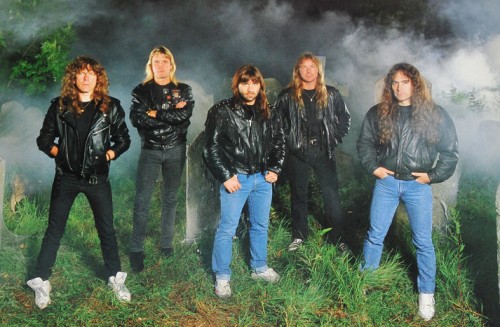
Still, I actually think this record is better than it’s given credit for. While Dickinson’s performance makes the whole tough to swallow at times, the composition on this album is actually consistently better than quite a few records that will land higher on this list. The songs are tight—listen to the intro to “The Assassin,” for example, or the leads and solo on “Run Silent, Run Deep”—the production is excellent, with Harry still playing bass like he was in a metal band where all the material was written from bass. The problem is that few of the songs really ever come together (unlike VXI which has a couple that glow). The only real standout win on NPftD is “Mother Russia.” This song is special, with an amazing bass line and fantastic feel: a single rose blooming in a barren field.
Given, though, that the music on here was actually really quite good, well-edited and well-produced, I believe that No Prayer for the Dying was unnecessarily bad. The band misfired on the lyrics and the feel, but not on the fascinating riffs and great solos from both Murray and Gers. “No Prayer for the Dying,” “Public Enema Number One,” “Fates Warning,” the masterful “Mother Russia” and others keep me coming back to this record in spite of everything.
#14: Fear of the Dark [1992]: Fear of the Dark was a hard record for me to admit was bad. Honestly, when it came out in 1992, I was the only pre-teen Iron Maiden fan left. I remember my brother buying me the tape (that makes me super trve, I guess) and then I listened to it repeatedly—even if the A side was a bit stronger than the B side. Still, despite the years and the nostalgia, I just can’t bring myself to say that this was a really good record. Instead, all the excesses of the death of glam rock and a band in turmoil mar what could have been a serviceable recouping of the losses from No Prayer for the Dying. Add to it that the band discovered that the LP was officially dead and started recording for the CD–consequently writing their longest record to date at 58 minutes—and this tops out a record that competes with the band’s poorest material, saved only by having a pair of timeless classics.
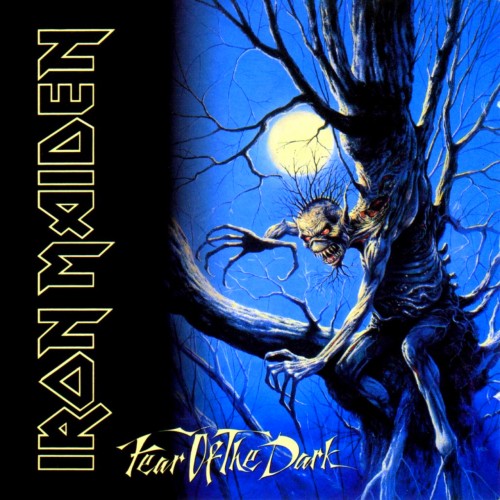
There are a lot of problems with Fear of the Dark, but let’s be honest, there’s still some things to love about this album. While the production screams 1992, there are moments of brilliance that shine through. The title track has become a crowd favorite—despite its oddly un-metal topic—and “Afraid to Shoot Strangers” was a brilliant song. I will never get those guitar harmonies at the end of the song out of my head. “Childhood’s End” is a song that few people give much credit, but I’ve always been a big fan of Nicko’s tom work and the leads. And while “Wasting Love” sounds like it came out of the same studio sessions as Skid Row’s “Quicksand Jesus,” it’s still got a soft spot in my heart.
The problem with Fear of the Dark was the ‘b-side.’ While it started off with the terribly underrated “The Fugitive” and finished with the epic “Fear of the Dark,” the path between the two is a journey through the belly of the beast. Jackyl-esque gang choruses on “Chains of Misery,” terrible blues rock on “The Apparition” and Bruce at his absolute worst in “Weekend Warrior.” They could easily have cut three or four songs. Sure, you might ask “What would this record have been without ‘Weekend Warrior,’ ‘Fear is the Key,’ ‘From Here to Eternity’ and ‘The Apparition’?” My answer is simple: better. This isn’t A material by anyone’s standards—and from the band that wrote “Moonchild” and “Powerslave” this was tripe.
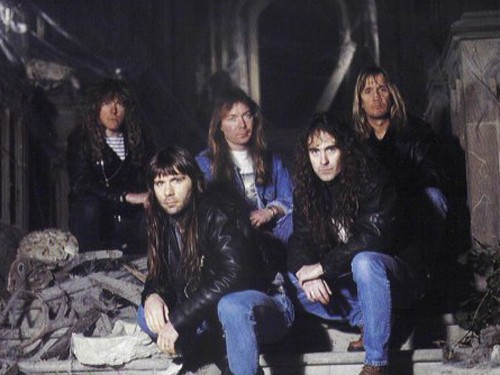
But it wasn’t just album length that was a problem, those songs weren’t good. Fear of the Dark is the specific point in time when Steve Harris starts to sound dangerously like a crotchety old man who is wondering whether or not his life is worth anything. The lyrics of “The Apparition” are the lyrics of an old man, shaking a crooked finger at society, while and “Fear is the Key” (“The kids have lost their freedom / And nobody cares until somebody famous dies!”) is an admirable, but clumsy, attempt at being topical that never really worked for me (h/t to Grumpyrocker for his insight on this matter). Bruce doesn’t help, either, with his vocal performance. By Fear of the Dark he was already pretty much out of the band and was singing with all the passion of a used pair of tights. Uninspiring stuff.
The ’90s were not kind to popular metal bands and Fear of the Dark, despite its nostalgic appeal to the little kid in me, isn’t an exception, definitely marking a pretty low point for these guys. Fortunately it’s onward and upward from here. Also, I just listened to “The Apparition” far more times than I’d ever wanted to.
#13: The Final Frontier [2010]: I can say that I was definitely on a fanboy high when I actually finally got a hold of The Final Frontier. I gave it a really great review and then a few weeks later I felt pretty embarrassed. In this context, I finally put my finger on the bane of Iron Maiden – an invention known as the compact disc. Let me take a short diversion1. Rod Smallwood once bragged that Iron Maiden always gives you, the fan, his or her money’s worth. Indeed, the band routinely filled up LPs to the very brim. Roughly 45 minutes was the limit, but Maiden was getting their records over the 50 minute mark at times. This meant that if they wanted to include an epic, other songs had to be shortened down because nobody, and I mean not even Iron Maiden, got to make double LPs in those days. Fear of the Dark didn’t break Iron Maiden’s string of great records, but it was the first Iron Maiden record that lagged. It was definitely not the last.
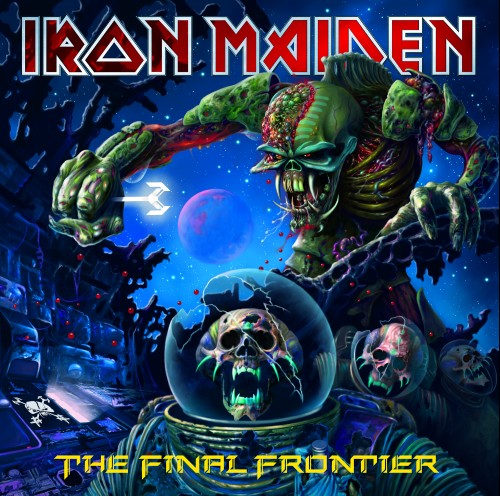
What occurred to me about The Final Frontier is that if the record had removed the first two songs and the last two songs, it would have been a pretty damned good record. I’m a huge fan of “The Alchemist,” “Isle of Avalon,” and “The Talisman” as much as tracks from almost any album. “Starblind” is standard modern Harris in form, but it totally works, and while “Coming Home” is kind of a melodramatic song about being a commercial pilot, it’s still a fine song. Put those together and you’ve got basically 42 minutes. Yeah, those are long tracks, but there’s great material.
But the brackets of the record really drag it down as a whole. “El Dorado” is miserable, shades of No Prayer for the Dying in terms of lyrical content and vocal performance, while “Satellite 15… The Final Frontier” was an interesting idea, it feels out of place, weird and lacks energy. On the back end “The Man Who Would Be King” and “When the Wild Wind Blows” are bloated, and lack the spark of the album-ending epics from A Matter of Life and Death. These long, plodding tracks are, well, long and plodding, with only the occasional meandering into unique or cool parts. They could have been edited down and made far more interesting–but you know, why? It’s not like they’re making records for VINYL anyway! “Give folks their money’s worth. All 80 minutes of it!”
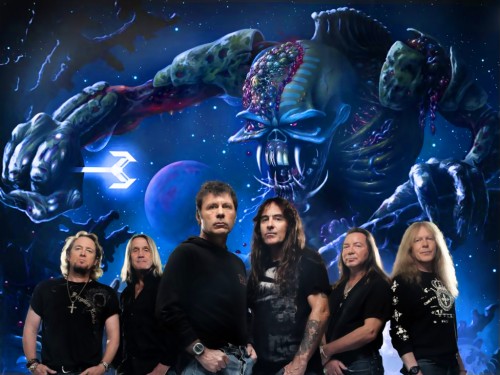
It’s worth saying that The Final Frontier features some of the worst lyrics that the band ever produced. While NPftD was bad from a lyrical perspective due to the sheer amount of cheese, this record sounds like the lyrics were written by Steve Harris in a single go without ever giving consideration how they would sound in context. The worst offender here was “The Man Who Would Be King,” but the whole record is laced with text that truly should never even be called ‘poetry.’ It’s hard to listen to at times, as the turns of phrase are just so awkward: (“I don’t hold with bad religion / Understand what’s underneath it / Now I come to think of it, I just don’t hold at all you know it.”).
While The Final Frontier is definitely the least of its modern kin, it is not a total loss. I just wish someone would say to Harris “Hey ‘Arry, write this next record for an LP and see how it turns out…”
